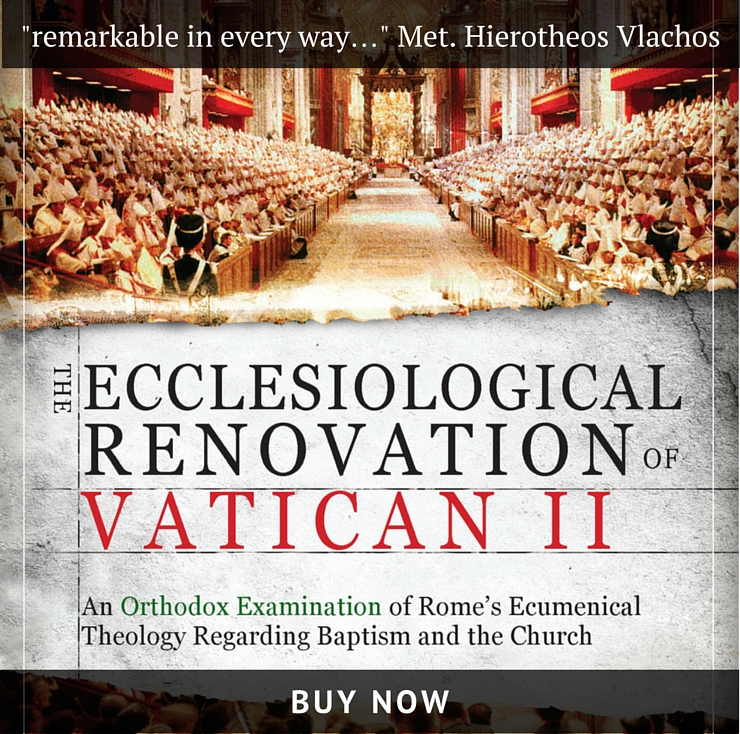Fr. Theodore Zisis introduces audiences to the oft-misunderstood Canon 15 of the 1st-2nd Council (861) of Constantinople and the canonical practice of ceasing the commemoration of bishops who have fallen into heresies condemned either by councils or by the consensus of the Holy Fathers.
The historic statements of hierarchs in Greece (Ambrose of Eleftheropolis and Avgoustinos of Florina) who ceased commemoration of Patriarch Athenagoras in 1970 are read in full, as well.
This lecture was delivered at the beginning of 2017 at parish of St. Anthony the Great in Thessaloniki, Greece.
The relevant canons discussed in the lecture:
Canon 13. The All-evil One having planted the seed of heretical tares in the Church of Christ, and seeing these being cut down to the roots with the sword of the Spirit, took a different course of trickery by attempting to divide the body of Christ by means of the madness of the schismatics. But, checking even this plot of his, the holy Council has decreed that henceforth if any Presbyter or Deacon, on the alleged ground that his own bishop has been condemned for certain crimes, before a conciliar or synodal hearing and investigation has been made, should dare to secede from his communion, and fail to mention his name in the sacred prayers of the liturgical services in accordance with the custom handed down in the Church, he shall be subject to prompt deposition from office and shall be stripped of every prelatic honor. For anyone who has been established in the rank of Presbyter and forestalls the Metropolitan’s judgment, and, judging matters before a trial has been held, insofar as lies in his power, condemns his own father and Bishop, he is not even worthy of the honor or name of Presbyter. Those, on the other hand, who go along with him, in case any of them should be among those in holy orders, they too shall forfeit their own rights to honor, or, in case they should be monks or laymen, let them be utterly excommunicated from the Church until such time as they spew upon and openly renounce all connection with the schismatics and decide to return to their own Bishop.
(Ap. c. XXXI; c. XVIII of the 4th; cc. XXXI, XXXIV of the 6th; cc. XII, XIV, XV of the lst-and-2nd; c. V of Antioch; c. VI of Gangra; cc. X, XI, LX of Carthage.)
Canon 14. If any Bishop, on the allegation that charges of crime lie against his own Metropolitan, shall secede or apostatize from him before a conciliar or synodal verdict has been issued against him, and shall abstain from communion with him, and fail to mention his name, in accordance with consuetude, in the course of the divine mystagogy (i.e., litrugical celebration of the Eucharistic mystery), the holy Council has decreed that he shall be deposed from office, if merely by seceding from his own Metropolitan he shall create a schism. For everyone ought to know his own bounds, and neither ought a presbyter treat his own bishop scornfully or contemptuously, nor ought a bishop to treat his own Metropolitan so.
(Ap. c. XXXI; c. XVIII of the 4th; cc. XXXI, XXXIV of the 6th; cc. XII, XIII, XV of the lst-and-2nd; c. V of Antioch; c. VI of Gangra; cc. X, XI, LXII of Carthage.
Canon 15. The rules laid down with reference to Presbyters and Bishops and Metropolitans are still more applicable to Patriarchs. So that in case any Presbyter or Bishop or Metropolitan dares to secede or apostatize from the communion of his own Patriarch, and fails to mention the latter’s name in accordance with custom duly fixed and ordained, in the divine Mystagogy, but, before a conciliar verdict has been pronounced and has passed judgment against him, creates a schism, the holy Council has decreed that this person shall be held an alien to every priestly function if only he be convicted of having committed this transgression of the law. Accordingly, these rules have been sealed and ordained as respecting those persons who under the pretext of charges against their own presidents stand aloof, and create a schism, and disrupt the union of the Church. But as for those persons, on the other hand, who, on account of some heresy condemned by holy Councils, or Fathers, withdrawing themselves from communion with their president, who, that is to say, is preaching the heresy publicly, and teaching it barehead in church, such persons not only are not subject to any canonical penalty on account of their having walled themselves off from any and all communion with the one called a Bishop before any conciliar or synodal verdict has been rendered, but, on the contrary, they shall be deemed worthy to enjoy the honor which befits them among Orthodox Christians. For they have defied, not Bishops, but pseudo-bishops and pseudo-teachers; and they have not sundered the union of the Church with any schism, but, on the contrary, have been sedulous to rescue the Church from schisms and divisions.
(Ap. c. XXXI; c. XVIII of the 4th; cc. XXXI, XXXIV of the 6th; cc. XII, XIII, XIV of the lst-and-2nd; c. V of Antioch; c. VI of Gangra; cc. X, XI, LXII of Carthage.
From: The Canons of the Eastern Orthodox Church
For historical context, read more about Patriarch Photius and the council.


Please be kind, lest your comment go the way of Babylon.